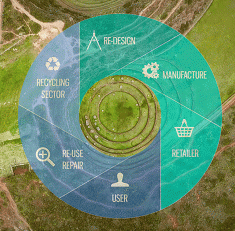
Complex global value chains include production facilities scattered all over the world. Sometimes, they may also involve practices of illegitimate subcontracting and undeclared informal work. In fact, their complexity and opacity make it very hard to gain accurate information about how and where environmental and socioeconomic impacts occur.
In order to increase the ability to manage value chains more sustainably and to transition to a low carbon and more circular economy, both consumers and businesses must first be aware of the nature and magnitude of these risks, and have the tools to measure, mitigate and prevent them. Improving the environmental, social and governance (ESG) traceability and transparency of value chains has therefore become a priority.
To help meet these needs, UNECE has established a Team of Specialists to improve ESG monitoring and reporting in value chains. This will support efforts to promote transformative change across key industries for the transition to a circular economy.
At its first meeting on 10 November 2021, over 170 experts attended the virtual discussions. Ms. Maylis Souque of the Ministry of Economics and Finance of France was appointed as Chair, and Ms. Nathalie Bernasconi of IISD Europe and Mr. Harm Jan van Burg of Burgcomm consulting as Vice Chairs of the Group. Participants discussed approaches and perspectives for advancing ESG performance in value chains through traceability, and the Programme of Work of the Team for the period 2021-2023.
Experts discussed a wide range of topical issues at the interface of sustainable/circular supply chains and transparency and traceability standards. Among others, they called for special attention to disadvantaged actors, including local communities, small-scale enterprises and smallholders, particularly those in transition and emerging economies. Capacity building for workers to up-skill and re-skill, and financing to make production methods more sustainable, to facilitate certification and to implement technology-based traceability solutions have an important role to play.
Experts also discussed international trade governance, highlighting that while there is a need for clear trading rules to establish a level playing field and open market opportunities, policy coherence and audit alignment to reduce the cost of compliance with a multitude of standards and labelling schemes are critical. Innovation and advanced technologies, like blockchain or physical and digital markers, were identified as offering potential solutions to identify and address both current and future risks. However, interoperability and the availability of a common language for information exchange along the value chain are essential to harness possible benefits. And when it comes to scaling-up circular business models, the traceability of secondary-raw materials and by-products for value retention in value chains was also identified as an important area where the Team of Specialists can add value.
Along these lines, the newly established Team of Specialists on ESG Transparency and Traceability of Sustainable Value Chains for the Circular Economy, will conduct work in the following areas:
- Policy dialogue and guidance
- Technical monitoring, assessment and advice
- Capacity building and partnerships
- Communication and outreach
In so doing, the Team of Specialists will be able to build on existing tools developed by UNECE and its subsidiary intergovernmental body, the United Nations Centre for Trade Facilitation and Electronic Business (UN/CEFACT). This wide range of practical instruments including norms, standards and policy guidelines can provide the backbone for action in critical sectors like agri-food, garment and footwear, fishery and transport.
Questions related to the ESG traceability of supply chains are high on the agenda of trade diplomats in Geneva and capitals, as WTO members prepare for the 12th Ministerial Conference. The Trade and Environmental Sustainability Structured Discussions Ministerial Statement refers to supply chain, technical and regulatory elements, as well as to the objectives of: “(i) achieving a more resource-efficient circular economy; (ii) promoting sustainable supply chains and addressing the challenges and opportunities arising from the use of sustainability standards and any related measures, in particular for developing Members; and (iii) promoting and facilitating access to environmental goods and services, including encouraging the global uptake of new and emerging low-emissions and other climate-friendly technologies”.
To become a member of the Team of Specialists on Environmental, Social and Governance Traceability of Sustainable Value Chains in the Circular Economy, please contact its UNECE Secretariat via https://unece.org/trade/uncefact/ToSTraceability.